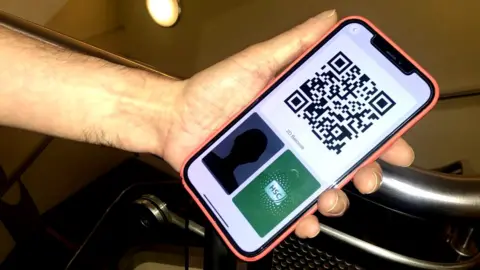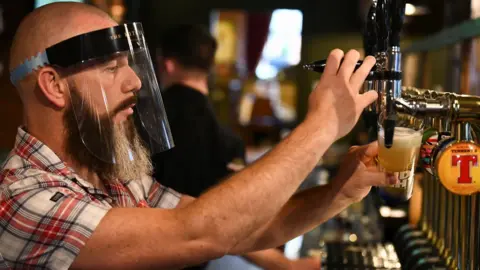Covid-19 vaccine passports in NI were lawful - judges
 BBC
BBC"Covid vaccine passports" introduced in Northern Ireland during the pandemic were lawful, judges have ruled.
The Court of Appeal said the Covid certification scheme was a proportionate and legitimate response to the pandemic's impact on the health system.
The passports were required to enter restaurants, bars and cinemas.
Judges rejected claims this was a violation of civil liberties for unvaccinated people.
They also rejected the argument that data protection rules were breached.
On Tuesday, Lord Justice Treacy said the regulations were "in accordance with the law and served a legitimate aim and were proportionate and justifiable".
In November 2021, the Stormont Executive brought in the certification scheme in an effort to curb the spread of Covid-19.
The measures - since scrapped - required proof of full vaccination status, a negative test, or proof of recovery from the virus to enter hospitality venues.
Belfast man Risteard O'Murchú and Darren Williams, from Carrickfergus, County Antrim, brought separate challenges over the lawfulness of the scheme.
Mr O'Murchú claimed the regulations were an unjustified and intrusive step which stigmatised and discriminated against those who did not get vaccinated.
Mr Williams claimed there was a breach of data protection in how confidential personal information was obtained through scanning customer's QR codes.
In February 2022, the High Court dismissed both challenges and ruled that the scheme was justified.
Even though the passports are no longer required, appeals were mounted against that decision.
Judges were told that there is still a power to reintroduce the step at any stage.
 Reuters
ReutersRuling on the cases, Lord Justice Treacy said there had been, unarguably, a legitimate aim behind the scheme which was backed by the chief medical officer and the chief scientific adviser.
"There was scientific evidence to support the argument that restricting access to vaccinated or non-infected persons in high risk settings has the potential to reduce transmission of the virus," he said.
Any interference with Mr O'Murchú's human rights was limited and did not prohibit attendance at high risk settings, the court held.
'Protecting public health'
It was open to him to take the option of providing proof of a negative lateral flow test within the previous 48 hours.
The tests were free and easily available then, the judge said.
"The appellant described this as an 'inconvenience' but that inconvenience has to be seen in light of and set against the legitimate and overwhelming aim of protecting public health," Lord Justice Treacy said.
"We consider it unarguable that the necessity/proportionality tests are not met."
Dismissing Mr Williams' appeal, the judge said it was "wholly academic, serves no utility and there is no public interest or good reason that this court can discern which would justify determining such a plainly academic matter."
